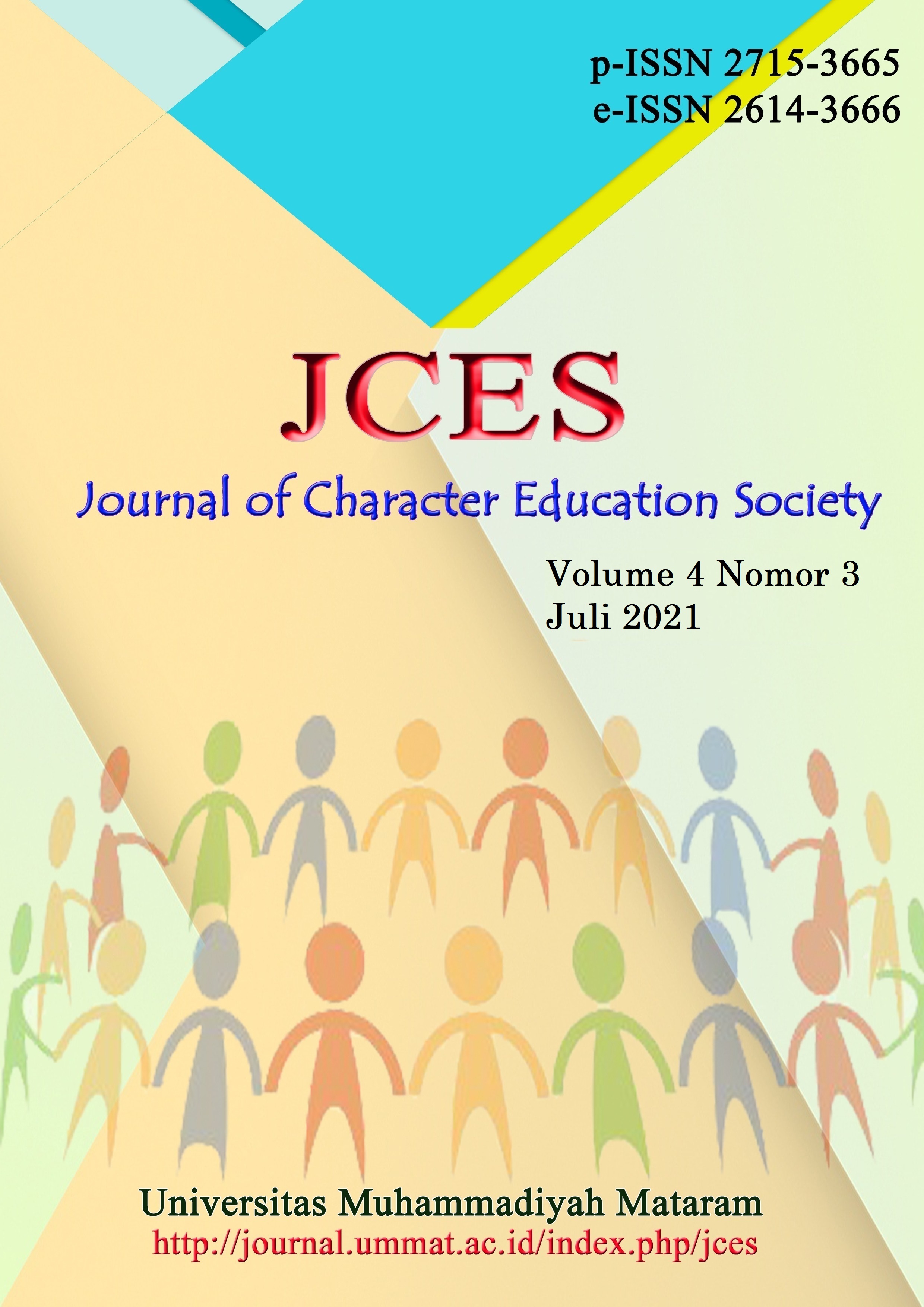THE READINESS OF LIMITED FACE TO FACE LEARNING IN THE NEW NORMAL ERA
DOI:
https://doi.org/10.31764/jces.v4i3.5658Keywords:
Webinar, Tatap Muka Terbatas, PAUD, Covid-19.Abstract
Abstrak: Pandemi covid 19 menjadikan cara belajar bagi peserta didik melalui daring. Pembelajaran melalui daring memiliki dampak negatif, salah satunya ialah penurunan kualitas pendidikan. Penurunan tersebut disebut dengan loss learning. Dikarenakan efek penurunan tersebut maka menteri pendidikan merencanakan pembelajaran tatap muka terbatas. Pembelajaran tatap muka terbatas memiliki pekasanaan yang berbeda seperti pembelajaran sebelumnya. Pembelajaran tatap muka terbatas ini diperlukan persiapan yang matang. Tujuan dari webinar ini ialah menginformasikan pada para pendidik, dan lembaga mengenai kesiapan lembaga PAUD yang tepat dan sesuai dengan standar yang baik. Webinar ini dilakukan secara online melalui Zoom Pro dengan berbagai peserta yang tersebar di Indonesia. Pendaftar webinar sebanyak 172 peserta dan diikuti oleh 83 peserta. Webinar ini memiliki respon yang baik yang terlihat dari banyaknya pertanyaan dan tanggapan dari para peserta.
Abstract: The COVID-19 pandemic has made online learning a way for students. Learning through online has a negative impact, one of which is a decrease in the quality of education. This decrease is called loss learning. Due to the decreasing effect, the minister of education planned limited face-to-face learning. The limited face-to-face instruction has a different atmosphere from the previous learning. This limited face-to-face instruction requires careful preparation. The purpose of this webinar is to inform educators and institutions about the readiness of early childhood education institutions that are appropriate and in accordance with good standards. This webinar was conducted online through Zoom Pro with various participants spread across Indonesia. There were 172 participants for the webinar and 83 participants. This webinar has a good response which can be seen from the many questions and responses from the participants.
References
Aronu, A., Awoer, C., Obinna, N., Ndudi, O. E., & Josephat, C. (2020). Readiness to Send Children Back to School in the COVID-19 Pandemic: Maternal Perception and Preferences. Journal of Clinical and Diagnostic Research, December. https://doi.org/10.7860/jcdr/2020/46257.14364
Engzell, P., Frey, A., & Verhagen, M. D. (2021). Learning loss due to school closures during the COVID-19 pandemic. Proceedings of the National Academy of Sciences of the United States of America, 118(17). https://doi.org/10.1073/PNAS.2022376118
Hanafiah & Suhan. (2012). Konsep Strategi Pembelajaran. Refika Aditama.
Kementerian Pendidikan, Kebudayaan, Riset, dan T. K. A. (2021). Panduan Penyelenggaraan Pembelajaran PAUDDIKDASMEN di Masa Pandemi Covid-19.
KEPUTUSAN BERSAMA MENTERI PENDIDIKAN DAN KEBUDAYAAN, MENTERI AGAMA, MENTERI KESEHATAN, DAN MENTERI DALAM NEGERI REPUBLIK INDONESIA, 41 (2020).
Kimkong, H., & Koemhong, S. (2020). Online learning during COVID-19: Key challenges and suggestions to enhance effectiveness. Cambodian Education Forum (CEF), December, 1–15.
Kristiyanto, R. Y., Chandra, L., Hanjaya, H., Hakim, M. S., & Nurputra, D. K. (2020). School reopening: Evidence-based recommendations during COVID-19 pandemic in Indonesia. Journal of Community Empowerment for Health, 4(1), 1–14. https://doi.org/10.22146/jcoemph.57524
Kusuma, W. S., & Sutapa, P. (2020). Dampak Pembelajaran Daring terhadap Perilaku Sosial Emosional Anak. Jurnal Obsesi : Jurnal Pendidikan Anak Usia Dini, 5(2), 1635–1643. https://doi.org/10.31004/obsesi.v5i2.940
Lo Moro, G., Sinigaglia, T., Bert, F., Savatteri, A., Gualano, M. R., & Siliquini, R. (2020). Reopening schools during the COVID-19 pandemic: Overview and rapid systematic review of guidelines and recommendations on preventive measures and the management of cases. International Journal of Environmental Research and Public Health, 17(23), 1–21. https://doi.org/10.3390/ijerph17238839
Mansyur, A. I. (2019). Webinar Sebagai Media Bimbingan Klasikal Sekolah Untuk Pendidikan Seksual Berbasis Online. JURNAL SULOH: Jurnal Bimbingan Konseling FKIP Unsyiah, 11(1), 1–14.
Maulyda, M. A., Erfan, M., & Hidayati, V. R. (2021). Analisis situasi pembelajaran selama pandemi covid-19 di sdn senurus: kemungkinan terjadinya learning loss. Collase, 04(03), 328–336.
Nissa, S. F., & Haryanto, A. (2020). Implementasi Pembelajaran Tatap Muka Di Masa Pandemi Covid-19. Jurnal IKA PGSD (Ikatan Alumni PGSD) UNARS, 8(2), 402. https://doi.org/10.36841/pgsdunars.v8i2.840
Slameto. (2013). Belajar dan Faktor-faktor yang Mempengaruhi. Remaja Rosdakarya.
Tadesse, S., & Muluye, W. (2020). The Impact of COVID-19 Pandemic on Education System in Developing Countries : A Review. October. https://doi.org/10.4236/jss.2020.810011
UNICEF. (2020). Guidance for Re-Opening of Pre=Schools and Kindergartens Post Covid-19.
Yulia, H. (2020). Online Learning to Prevent the Spread of Pandemic Corona Virus in Indonesia. ETERNAL (English Teaching Journal), 11(1), 48–56. https://doi.org/10.26877/eternal.v11i1.6068
Downloads
Published
Issue
Section
License
Authors who publish articles in JCES (Journal of Character Education Society) agree to the following terms:
- Authors retain copyright of the article and grant the journal right of first publication with the work simultaneously licensed under a CC-BY-SA or The Creative Commons Attribution–ShareAlike License.
- Authors are able to enter into separate, additional contractual arrangements for the non-exclusive distribution of the journal's published version of the work (e.g., post it to an institutional repository or publish it in a book), with an acknowledgment of its initial publication in this journal.
- Authors are permitted and encouraged to post their work online (e.g., in institutional repositories or on their website) prior to and during the submission process, as it can lead to productive exchanges, as well as earlier and greater citation of published work (See The Effect of Open Access).

